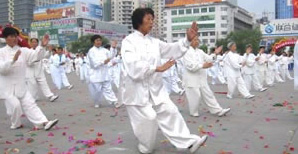
From 1982 to 2001, it took China less than 20 years to go through the population aging process, which took up to a hundred years in developed countries, and CAS members warn in a consultative report submitted to the central authorities recently that our country is overdue in preparing to cope with the problem.
The report,"Suggestions on Issues of China's Aging Population," was completed by a panel of CAS members under the auspices of the CAS Academic Division of Biology on the basis of a study starting from October 2000.
In 2001, the number of Chinese people aged 65 or older reached 90.62 million, accounting for 7.1% of the total population. This indicates that China has entered the era of an aging society, says the report. What is more, the growth rate of Chinese older than 80 is higher than that of senior people as a whole. The report points out that the economic and fiscal pressure of the aging population is being felt in increased expenditures on such things as pensions and medical services. The experts describe the situation as "getting old before being well-off."
The aging population will have wide-ranging and deep-going influences on the country's socio-economic development and the people's livelihood. The report asserts that, as a country with an economy that is not highly developed, China is in a dilemma when facing the problems of both an aging population and population control.
The report makes suggestions on how to face this challenge. First of all, a correct attitude toward the aging phenomenon must be introduced. It is a one-sided view to be pessimistic about it and over-emphasize its negative impact: this puts unfair mental pressure on old people. Instead, society must give full play to old people’s ability to play useful roles and encourage them to adapt to social reality.
The government should also solve the problems concerning old people's social security and medical services in rural areas and establish an pension system for those in small cities and townships. Lonely old people in the rural areas must have sufficient food and clothing, housing and medical services, and the assurance of a dignified funeral.
The report calls for strengthening health and hygiene education for the aged, the prevention of diseases of the elderly and convalescence, and an improvement in their ability to keep fit and well by themselves.
The report stresses educational and research undertakings in the field of gerontology. It suggests gerontological medicine, pharmacy, nursing and other specialties be instituted in medical colleges and that social gerontology be listed in university curricula.
A public ethic supportive of old people should be encouraged. Our old citizens have made their contributions to the country, society and their families. Reciprocally, society should support them in their advanced years. As a weak community, old people should receive more help. They should not be discriminated against just because they are old. They have the right to participate in social development, and to have a say in decisions concerning their own affairs. (Guo Haiyan & Zhao Baohua)







